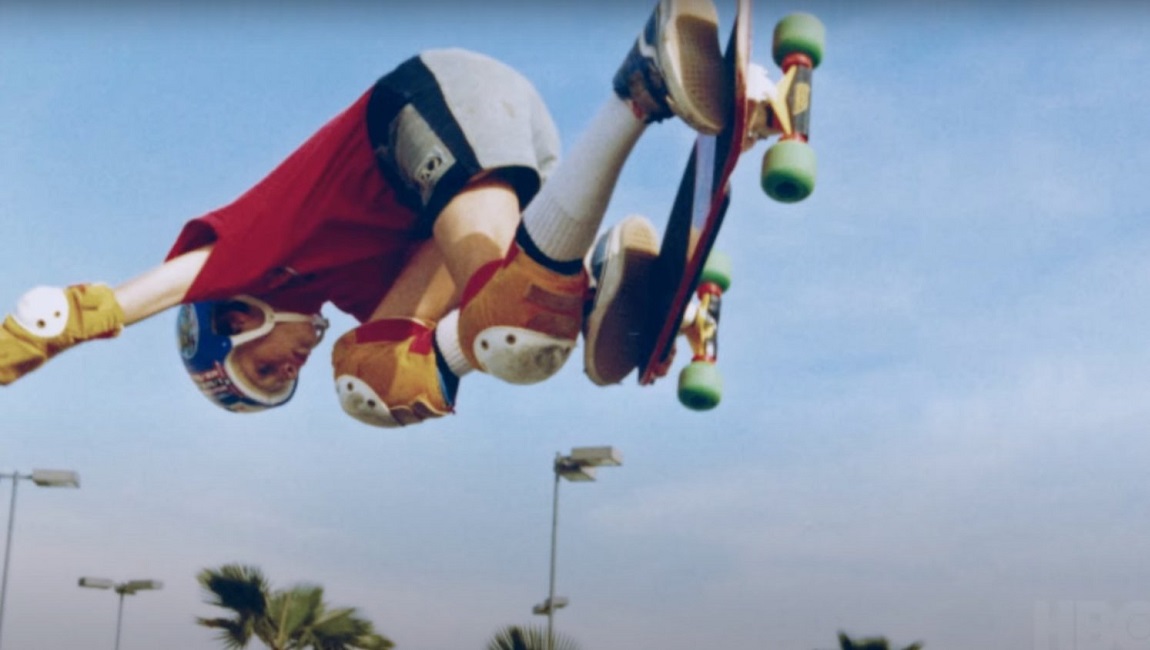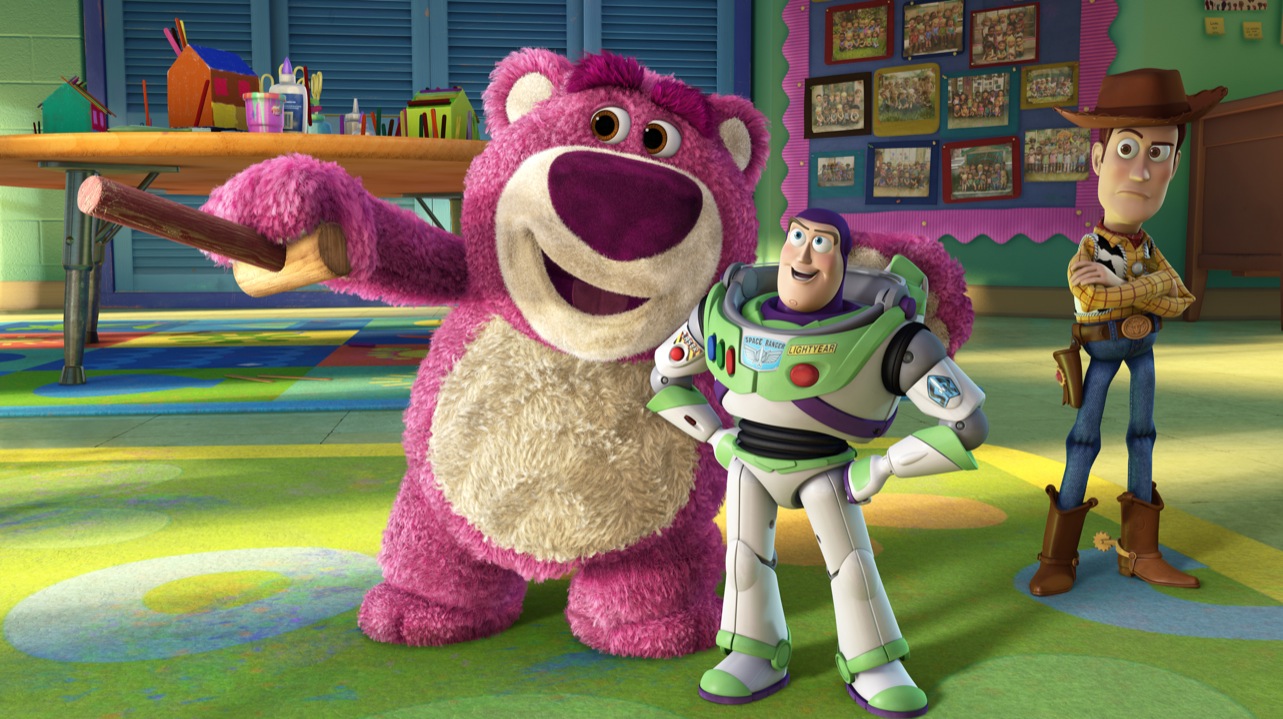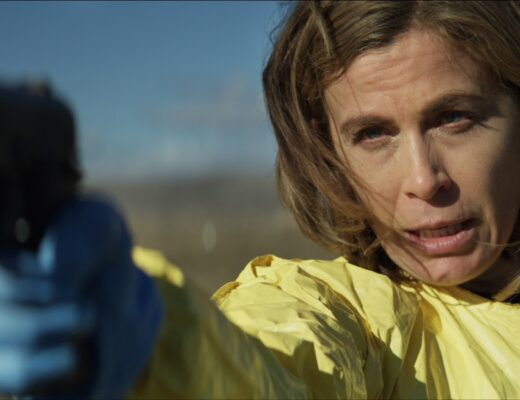Until the Wheels Fall Off works well as a survey documentary, not necessarily penetrating but reveling in the small mysteries that careers like Hawk’s are built on.
It’s a bold move to open a documentary about a world-renowned and widely beloved athlete with several minutes of abject failure. But that’s exactly what Sam Jones does in Tony Hawk: Until the Wheels Fall Off, which shows Hawk in a cavernous, echoing facility, failing to stick a dozen-odd attempts of the notoriously difficult 900. Hawk, now 53, slams onto the wooden ramp again and again, growing palpably more frustrated with each attempt. The board goes flying as he skids to a stop on his knee pads. It’s the perfect showcase for the steely determination, laser intensity, and pure drive that have defined the skateboarding legend’s career, from his early years as a scrawny teenage outcast to his later career as an elite pro athlete, video game mogul, and household name.
Growing up in Southern California during the 1970s, Hawk was the youngest child (often referred to as a “mistake” by his parents) with much-older siblings and a stubborn, spastic demeanor that often pushed his exasperated family to the brink. Skateboarding, which he discovered at age 9, became an instant obsession; it channeled his intractability into something tangible and productive, and he started entering local competitions two years later, before turning pro at 14. This basic narrative is nothing exceptional — all successful athletes are unwaveringly dedicated and disciplined — but Hawk has been a household name for so long that it’s easy to forget he was once a gangly kid, intimidated by the cool crowd and desperate to fit in.
Based on wide-ranging interviews with his family and a bevy of fellow pros, and interspersed with entertainingly grainy interviews and videos, Jones builds a richly-layered portrait of Hawk as a young up-and-comer whose early promise won him as many fans as rivals. His technical prowess irked more established skaters like Duane Peters and Christian Hosoi, whose showmanship and punk rock ethos contrasted with Hawk’s tightly wound intensity. But when Hawk eventually found his way to the Bones Brigade, a team of promising teenagers curated by the legendary Stacy Peralta, he had the support and mentorship to truly hone his highly technical style.
Peralta, whose commentary provides elder statesman gravitas throughout the documentary, focuses not just on Tony but the larger historical context of skateboarding as a movement. Equally compelling are interviews with Rodney Mullen, a world-class freestyle skateboarder who injects his craft with balletic grace and control. “We skate with our hearts,” he says simply, turning to the camera with a beatific smile. His nuanced insights into Tony’s psyche as he climbs the ranks, eventually turning into a skating “machine” and burning out, often go where Tony himself doesn’t.
As an interview subject, Tony is forthright and engaging but not necessarily vulnerable, although it’s not surprising: Until the Wheels Fall Off isn’t a psychological portrait but a career survey. It covers thirty years of accomplishments in chronological order, not a single, one-time feat of impossible daring. Elements of Hawk’s personal life make appearances but are never the main subject — two of his four marriages are left out altogether — although he does speak with heartfelt candor about his relationship with his father, Frank Hawk, an ex-military “bull in a china shop” who started the National Skateboarding Association to give his son’s passion a legitimate governing body. During the documentary’s two-hour runtime, Jones also touches on Mike McGill’s invention of the McTwist in 1984, Hawk’s landmark 900 fifteen years later, and the skate industry’s lean years in the early ’90s, which would be revived by the X-Games and the Tony Hawk’s Pro Skater video game franchise.
Jones places his interviewees outdoors, often at the bottom of a vert or in an empty skatepark, showing these middle-aged dudes in the same setting where they cut their teeth as teen phenoms 30 years ago. It all builds up to the film’s poignant third act, where Peralta re-assembles the Bones Brigade to recreate one of their most famous videos. Tony unexpectedly wipes out and mortality suddenly rears its head in a much more menacing way. Beneath the tricks, fame, and notoriety lurks the central question: why do they put their bodies through this? Dozens of concussions, busted knees and shoulders, knocked-out teeth, whiplash… the list goes on. It’s not a question that can be easily answered; it may not even be worth asking.
Hawk, incidentally, broke his femur the night before the trailer for this film was released. “I’ll be back,” he says. “Maybe not at full capacity, but I resigned to that notion years ago as I approached ‘mid-life.’” A few weeks later, he was walking down the Oscars red carpet with a cane, though he presented an award on stage unaided. And that 900 the film opens with? He sticks it, of course, after many attempts but with no thought of giving up. As he noted on Instagram at the SXSW premiere, “the wheels have yet to fall off.”
You can stream Sam Jones’ Tony Hawk: Until the Wheels Come Off on HBO Max beginning on April 5.







